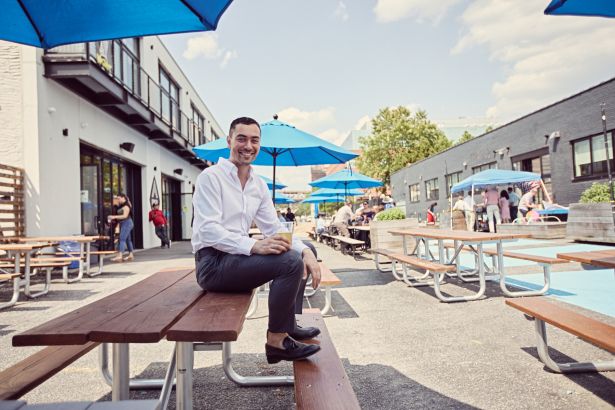Adam Joly Wants to Keep Things Shifting in Long Island City
Through the Vorea Group and Igloo the North Carolina transplant helps craft projects meant to reflect the Queens enclave’s changeover from industrial
By Amanda Schiavo August 12, 2025 11:30 am
reprints
When Adam Joly, principal of commercial real estate brokerage Igloo, first moved to New York City from Fayetteville, N.C. — after a two-year detour in Sydney, Australia — in 2010, launching a career in real estate was the furthest thing from his mind.
His plan was to be a drummer. (He’s a big Kendrick Lamar fan, and his favorite drummers include Taylor Hawkins and Steve Jordan.)
But trying to make it in the New York City music scene isn’t easy, especially when there are things like paying the rent to consider. So Joly, who also serves as senior development manager at The Vorea Group, started taking on some part-time jobs renovating friends’ apartments, or building out bars and restaurant spaces — something he had previous experience doing.
“When I was in high school, I started a business with my parents where we would purchase, design and renovate dilapidated single-family homes,” he said. “I was able to save up enough money to travel abroad and live out some of my dreams as a musician.”
Eventually, as he became more involved with the city’s real estate scene, he traded his drumsticks for property agreements, and his side hustle became his new passion.
Joly joined Vorea in November 2013, after becoming acquainted with its founder and principal Peter Papamichael. Joly would help create the Igloo platform a few years later.
“I started more on the construction management side,” Joly, 34, said. “There’s a development platform and a construction management platform. I transitioned over to development a few years after I started, and then we found that there was a need within our development projects to help curate these spaces for different retail uses, and we started to take on a lot of that work ourselves. And we formed the Igloo platform back in 2016.”
Igloo connects businesses to different communities and neighborhoods in the city.
“We specialize in retail, restaurant, office and maker spaces for concepts that are looking to relocate, expand, or start up in NYC,” Joly said of Igloo. “We are able to support these efforts by sourcing dynamic real estate locations and we also have the in-house platforms to provide design, construction and capital solutions for scaling businesses. Igloo also partners with property owners to create commercial activations, which deeply impact projects and neighborhoods across NYC.”
Igloo was at first focused solely on its own development projects, rather than third-party business partnerships. That vision slowly evolved over the last eight years, and now Igloo is partnered with a variety of developers working on a number of different projects.
One in particular is the Jasper, a 499-unit residential building located at 2-33 50th Avenue in Long Island City, Queens. The Domain Companies, LMXD, the Vorea Group and Bridge Investment Group developed the building that features 35,000 square feet of 100 percent leased ground-floor retail.
Joly’s priority for a development like this is finding a mix of retail that fits the needs of the people living in the building.
“We’re working to program all of these commercial spaces from a planning standpoint, early on in the development process through to completion, and even helping with tenant fit-outs,” Joly said. “[The Jasper] is a great example in our body of work.”
The building got its temporary certificate of occupancy in May, and Joly’s team had pre-leased all of the retail space prior. “It makes a huge difference when renters are coming in and they know they’ll have 10 different retail concepts,” Joly said.
Providing tenants with a variety of retail options within the building is an amenity unto itself, Joly noted, which helps draw in residents. The Jasper was 75 percent leased as of publication, and some 30 percent of the units are designated affordable housing.
Some of the retail options on the building’s ground floor include a mobility-improving studio called StretchLab, children’s camp KidStrong, the boutique pilates brand Club Pilates, and children’s clothing store Peanut and Honey.
“It’s an ideal space for our second children’s clothing store,” said Kay Rigo, chief financial officer for Peanut and Honey. “The neighborhood is very family-oriented, and there are shops and pharmacies and restaurants down the street. There is also a park that’s not too far. So we figured this is probably the best space to start scaling our business.”
Rigo pointed out the convenience to people living in the building of having a shop like Peanut and Honey at its base.
“We’re pretty neighborhood focused,” Joly said. “We love investing in neighborhoods, and we love building retail that’s really community focused.”
That sense of community extends into the relationship with the retailers themselves. Joly says he takes a hands-on approach to the tenant experience, ensuring that the firm is offering more than just a place to set up shop.
“We found that a lot of tenants need more support than just location sourcing, which is typically the role of the broker, and we’ve built an in-house design platform and a construction management platform as well,” Joly said. “So we are able to evaluate a space and work through real construction budgets for fit-out and manage the design process and really offer support in many different ways.”
Joly chalks this approach up to why the leasing platform for the Jasper has been so successful. Igloo is able to internally navigate a lot of the hurdles that typically come up during the leasing process.
Joly’s very career in Long Island City embodies the area’s changes. Long Island City was, for a long time, a gritty enclave with a lot of industrial businesses intermingling amid terrible traffic with the odd cluster of houses or small apartment buildings. Now, the old factories are new lofts, and the vibe has completely changed. Like Joly, Long Island City is young and energetic, finding a new generation of retailers and residents to bring in culture, community and ambience.
Claire Young, a 28-year-old medical student attending New York University, lives at The Jasper with her boyfriend. The couple decided Long Island City was the right choice when they started to consider moving out of Manhattan.
“We won the housing lottery,” she said of the literal process for affordable housing at the site. “I’m in medical school at NYU, and I wanted a good commute. My boyfriend wanted out of Manhattan, and it kind of worked perfectly, because I can just take the ferry. I really like the neighborhood, it’s very charming. I feel very safe and it’s nice to be by the water.”
Long Island City has been blowing up since before the onset of the COVID-19 pandemic. Indeed, a 2018 blog post from Douglas Elliman noted the area’s transition from its former life as an “overlooked stretch of industrial Queens waterfront.” Today, Long Island City is a hub for families, couples, singles and everyone in between who are looking for that iconic New York City vibe without having to be in Manhattan.
A lot of the evolution of the neighborhood can be attributed to rezonings that emphasized mixed-use projects, particularly with residential components.
There have been at least two major rezonings for Long Island City, including one in 2001, which was the initial movement to shift the area from industrial to mixed-use. This year Mayor Eric Adams announced the OneLIC rezoning, which is supposed to add 14,700 new homes with mandatory affordability and increase commercial and industrial space in the area.
“We first started investing in this market more than 10 years ago … and we just felt because we understood the trajectory of the residential population that we could build in commercial spaces that helped support that growth,” Joly said.
Through Igloo and Vorea, Joly is involved with several projects throughout Long Island City.
The Gantry View School is located on 50th Avenue and the space it now occupies was previously used by a security company. Igloo helped to convert the space into a private K-8 school. They also worked with the ice cream shop Emack & Bolio’s that now occupies the same building. (Honestly, what is a smarter business plan than putting an ice cream shop next to a school?)
There is also an 18-unit residential building currently under construction at the corner of Vernon Boulevard and 50th Avenue. Igloo is the landlord representative on that building, working to fill the 4,000 square feet of ground-floor retail. The firm is developing what it’s dubbed “the 12th Street Campus,” too.
Back in 2017, Vorea acquired 12-01 44th Avenue, formerly a warehouse that an envelope company occupied. After the acquisition, Vorea converted it to product testing and office space for Wirecutter, The New York Times product recommendation service.
Joly and his teams also worked on a public space between the Wirecutter building and the Focal Point Brewery located at 43-50 12th Street.

“The 12th Street Plaza,” as the developers call it, was developed in partnership with the New York City Department of Transportation. The plaza is accented by an immovable ancient glacier rock formation and was converted in 2019 from a city street that had been used historically as an illegal parking lot and a dumping ground for broken vehicles. DOT designated it as a public plaza in 2020.
“We knew that something really special was happening here from the plaza,” Laszlo Fodor, one of the brewery’s three owners, said. “We wanted to be a part of that … It’s been amazing to see 12th Street develop. If you look at the before and after photos of this block it is mind-blowing.”
Across the street at 44-01 11th Street is the Metropolitan building, which has seen many lives as a furniture storage space, a photography space and an events space. Mega Development and the Vorea Group are leading the redevelopment of this four-story building, which is meant to be a boutique hub for New York City’s design community.
The building will feature move-in-ready showrooms as well as maker and artist spaces for creative and design concepts, including vintage furniture platform the Somerset House and material library platform Sample House. Vorea and Igloo will also take office space in the building.
“We’re revamping the building entrance now,” Joly said. “So, we’ll have an accessible entrance from the sidewalk. And then we’ll have Somerset House on the fourth floor. We’re moving our office to a portion of the third floor, and then we’ll have other types of showrooms, maker spaces, antique furniture businesses and art restoration companies come in.”
It was important to maintain the charm of the Metropolitan building, Joly said, which is a theme you can see in many of the projects he is involved with in Long Island City. The neighborhood itself has an almost small town vibe, despite its big city proximity and lifestyle of those living there — which appears to be the draw for both residents and retailers.
“Long Island City is the most connected neighborhood in terms of access to the city,” he said. “It’s been a very convenient focal point of New York City for a long period of time, but historically the complaints about Long Island City was where’s the culture? Where are the bars and restaurants and other neighborhood amenities? And I think now that you have a real captive residential population that’s continuing to increase year over year, retailers have woken up to the opportunities here.”
Amanda Schiavo can be reached at aschiavo@commercialobserver.com.



